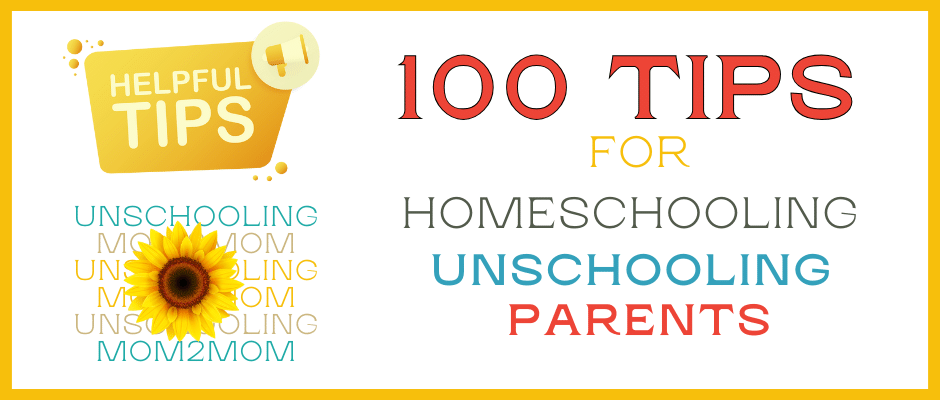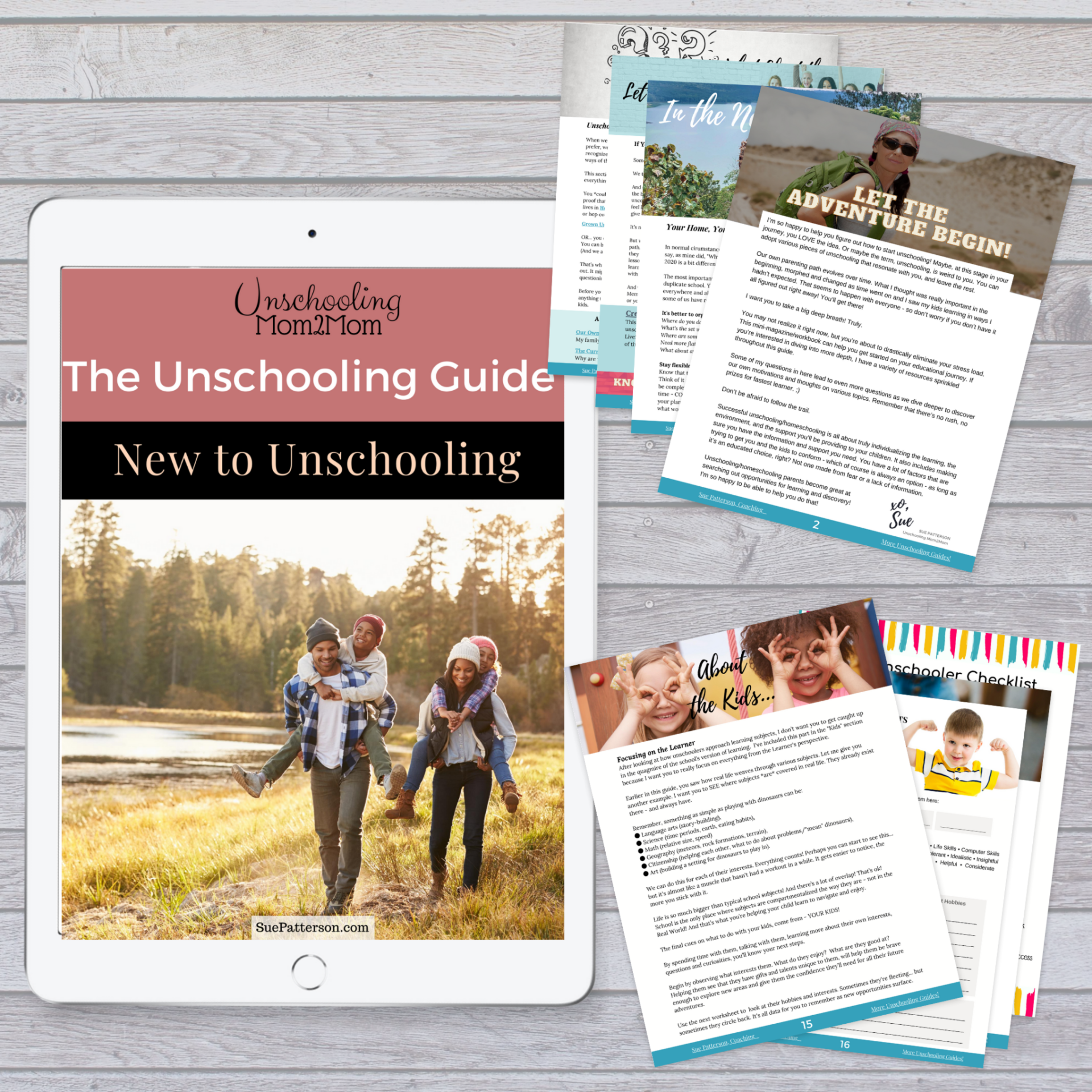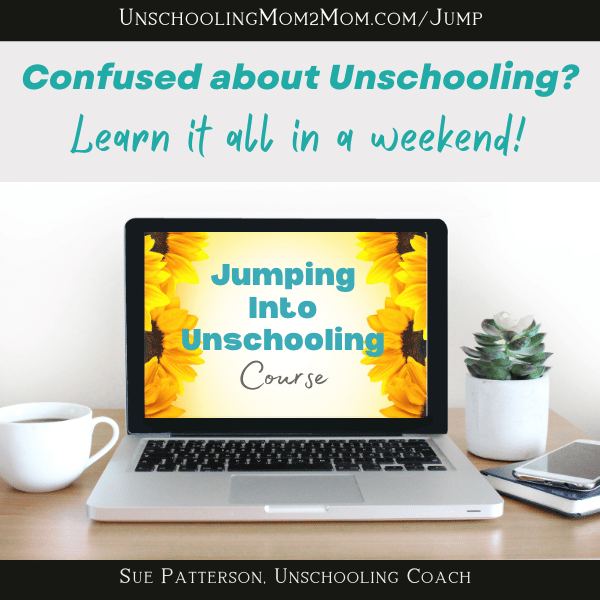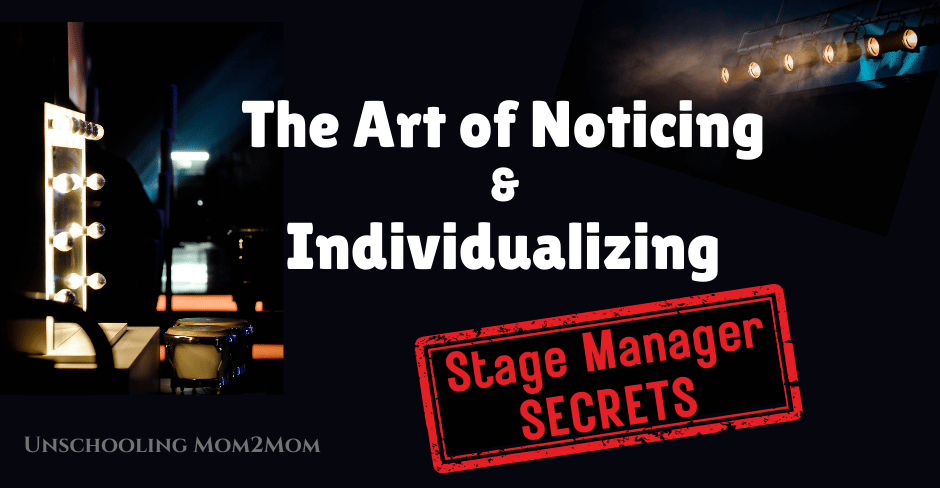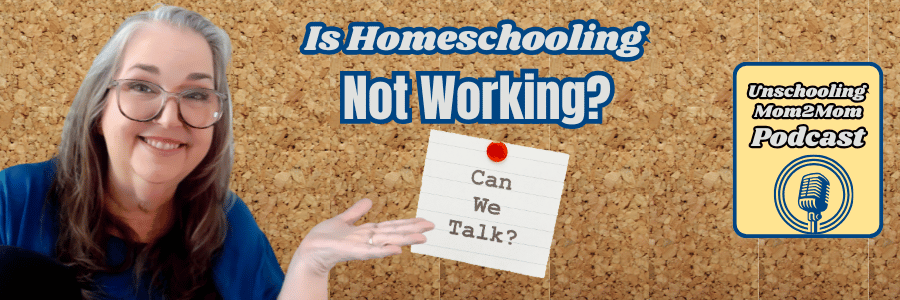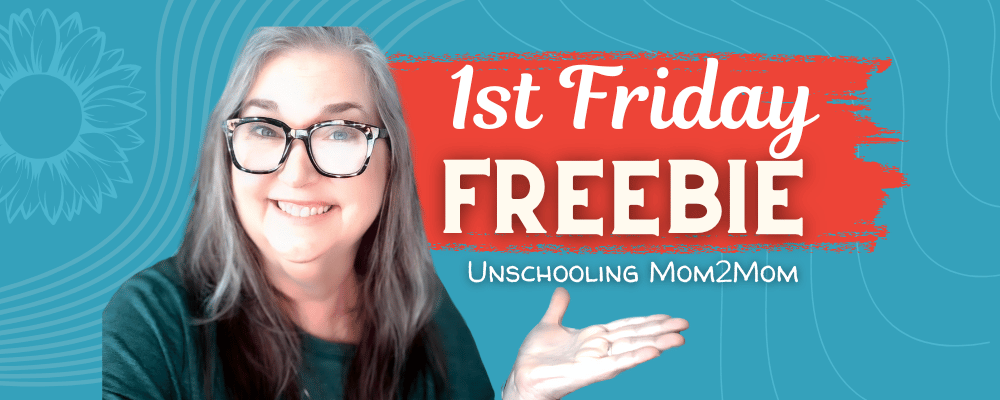100 Tips for New Homeschool Moms
Even if you've never heard of unschooling, this list is for you!
So many parents step away from the schools with no idea how different their lives are about to be!
They may not have even HEARD of the word "Unschooling" yet.
I hadn't.
Back in 1996 when we started on this path, my kids were 7, 5, and 2.
I thought I'd just make subjects more creative. The school model of teaching/learning was all I knew.
But now, that's way behind me and I've learned a lot. My own "kids" are currently 34, 32, and 29!
This was such a fabulous way to live with my family, learning right alongside my kids as they experienced a childhood I wish everyone's kids could have. Of course, everyone is unique, and your kids would have different experiences from mine.
But, still full of wonder and adventure! I want to encourage you to reach for that!
100 TIPS
To Help you as you're beginning this journey.
I'll give you the list, but I'll link to ways you can explore some ideas more.
And you can always do this in a community of other unschooling parents:
I'm going to read through all the random tips I think you need to know. So grab a cup of coffee, sit back, and ponder my list. And you can get even more out of it if you pause the recording when you have a question.
You can leave a comment saying,
"About #whatever..."
or just write,
"about this thing you said... what does that mean, or how can I wrap my brain around that?"
So if it were me, I'd listen or read the way through first.
And then I'd come back and stop and start with the questions I have from this list.
Ready... go grab your drink and we'll dive in!
- The ideas you have in the beginning of this journey will change over time.
- Don’t duplicate school - that’s what you’re trying to get away from, right? Don't Duplicate School Video
- Spend a little time each day learning something more about deschooling.
- Think about your own personal “why” for choosing this educational path. Get specific. Refer back to it when you have a hard day. Thinking about "Why?" podcast/blogpost
- Remove the pressure to “get it all right.” It doesn’t work like that.In fact, expect that you will get a lot of things wrong! You have a big fear of being wrong because school was all about "one right way." You'll undo that over time. And your kids won't feel near the pressure that you do.
- Know your laws and how to comply. They're different from state to state, even country to country. Talk to the unschoolers to see how we manage to meet the legal requirements - and still unschool.
- Don’t rush through childhood. They only get one! Don't miss it doing things and jumping through hoops that weren't even necessary.
- Play more games!
- Take a lot of photos!
- Take a lot of deep breaths - more oxygen will help you!

11. Don’t stick with something that isn’t working. You have a lot of choices!
12. Don’t push something if your child resists, give them time. Sometimes the problem is timing. Or maturity. Or your lack of deschooling.
13. One of the goals is to help your child love learning - frustration interferes with that.
14. Stay flexible - you’re a family, not a system.
15. The world does not need to be divided into Educational and Non-educational activities.
Everything is educational!
16. Learning isn’t as linear as we’ve been told - kids can learn all kinds of things “out of order."
17. Let the desire to know about something be the catalyst to explore more.
18. Grade level learning is necessary in schools - but your kids can let their interests direct the course.
19. Kids learn to read at all different ages - there’s no rush!
20. Reading isn’t the Holy Grail - Learning is! And there are all kinds of ways non-readers learn!
Get the
Unschooling Guide: Learning to Read as Unschoolers
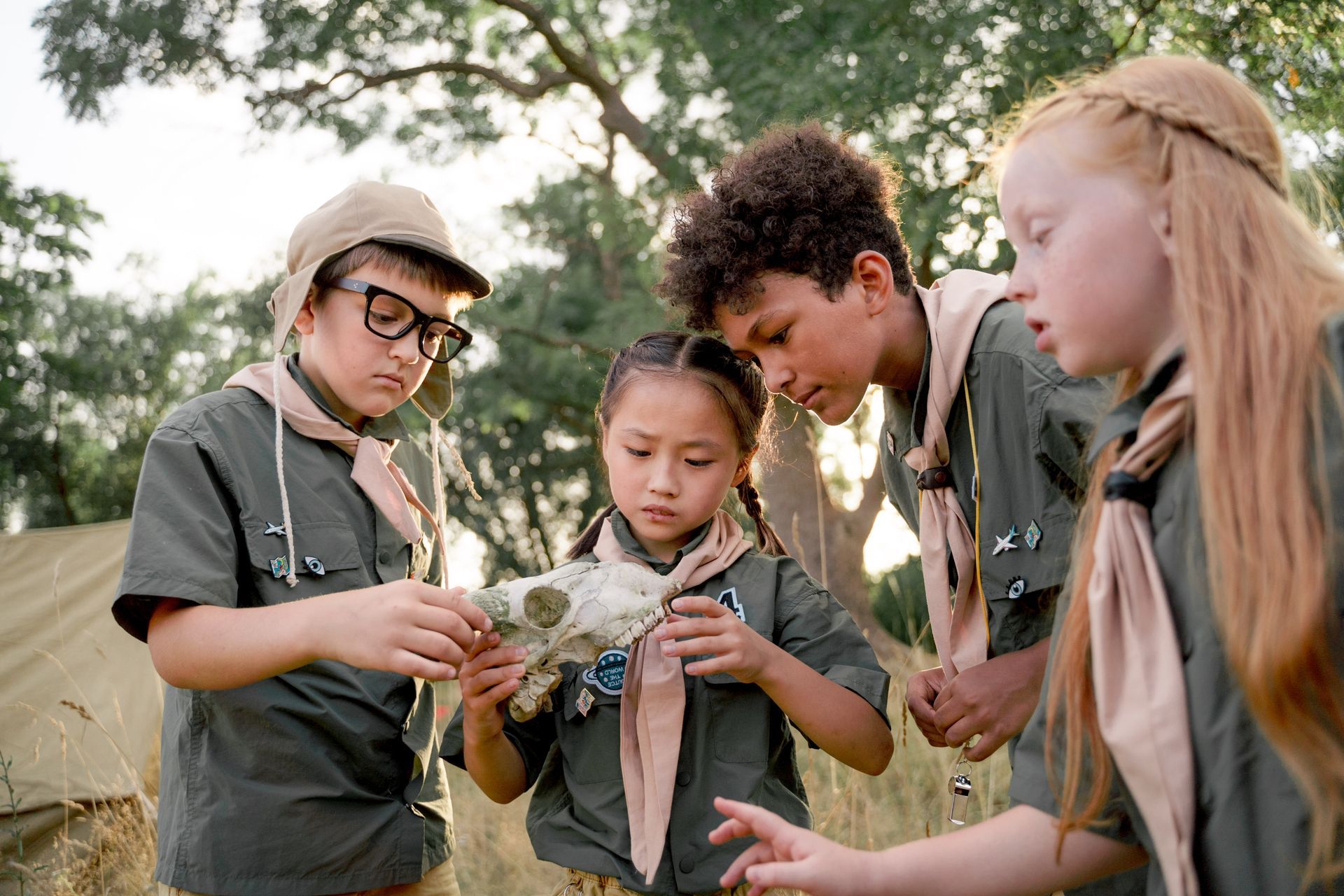
21. Use your community - tap into resources. Finding the locals
22. Use your online community - tap into resources there too! Join my Membership Community
23. Think like a tourist - what’s cool to do NOW that you have time to do it?
24. Relationships matter most - create more connection between you and your child.
25. Focus on the Learner and not that trappings of Teaching. Reframing Teaching, Learning, and Unschooling
26. Don’t hold onto a story in your head about all of this - at the expense of that child standing in front of you.
27. Comparison steals joy - don’t compare yourself to other homeschooling/unschooling parents.
28. Don’t compare your child to any other children.
29. You do not have to “fix everything.” Work on being a good listener to your child.
30. Schools taught us to compare and compete - recognize and resist.
Resist the urge to compare

31. Create more flat surfaces for projects.
32. Get outside and enjoy the seasons.
33. Don’t buy curriculum - use the library, the internet, and your children’s interests. Surviving Curriculum Season
34. Take everyone’s advice with a grain of salt. They don't have YOUR kids, YOUR situations, YOUR experiences. Learn from them, but individualizing means taking what you need and leaving the rest.
35. Use this time to really get to know your child and their preferences.
36. Create a rhythm for the day or the week instead of a strict schedule everyone will resist.
37. Think “Life Skills” over “Academics.”
38. “The Basics” don’t need special attention - they show up every day in activities. Look for them.
39. You don’t need a homeschool room. Think of what activities naturally occur in which rooms. Creating an Unschooling Home
40. Don’t artificially divide the world up into subjects. Schools do that, but the real world doesn’t.

41. Every child learns differently - get to know their individual style and rhythm.
42. Resist expecting kids to learn the way you did or wish you could have as a child. They’re unique.
43. When you’re an adult, no one cares about the age you learned to read or add.
44. Colleges and universities accept teens who have learned in an unconventional way. All the time. More about teens & college
45. Every day can be different - a cozy stay-at-home day or a fun adventure out and about. Choose Your Own Adventure!
46. Learning has no “Finish Line.”
47. 18 is not a Magic age - don’t accept the pressure that you have to be “done” by then.
48. Don’t suck the fun out of something by turning it into a “teachable moment.”
49. Ask yourself “why?” or “why not?” if your kids want to do something you didn’t anticipate. Don't let your ego make you upset. It's all just data for your next decisions or suggestions.
50. See what part you can say “yes” to, instead of “no.” Lead with "Yes" when you're responding.
51. Resist the urge to shame or guilt-jerk your child into compliance.
52. Gaps are okay - we all have them. And we all can fill them if we need to. “Hello Siri?”
53. Mistakes are really opportunities to gain more data for the next similar situation.
54. Go with the flow.
56. Learn your child’s pace for learning and living.
57. Messy houses are to be expected - kids live there every day! My House is a Mess!
58. Do your own “inner work” to undo your own conditioning - it’s time to overcome people pleasing, or looking for kudos for over-achieving.
59. “Balance” is over-rated. The arc is way longer than a day or a week.
60. Don’t give grades or quizzes. It interferes with learning.
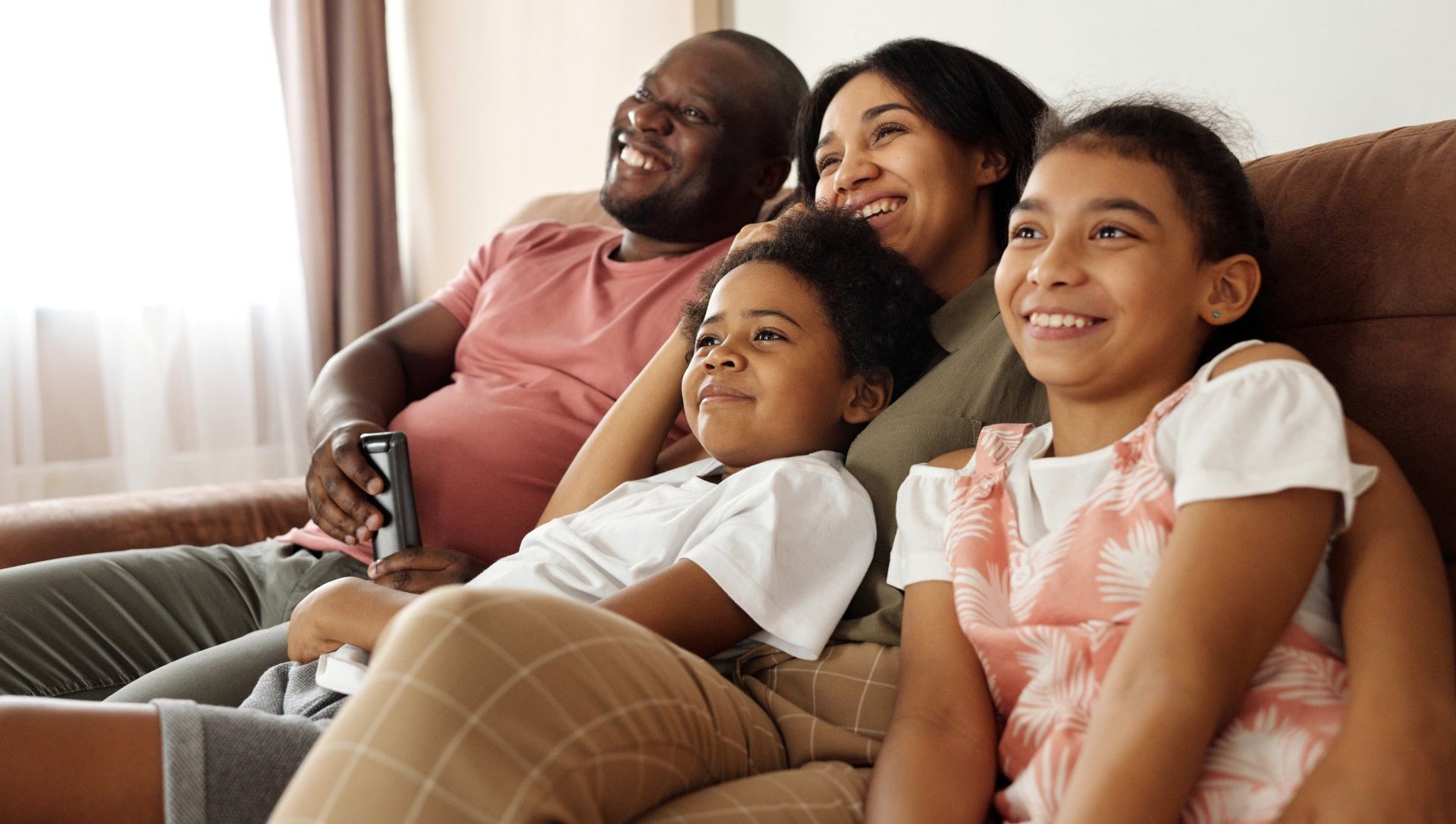
61. Hard days will come - check first if you’re hungry, tired, or feeling out of sorts. It may not be the homeschooling part!
62. Go ahead and sleep late. Enjoy your freedom!
63. If you start to feel disconnected from your kids, lean into what they’re doing for fun. Ask questions. Be interested in them. It will strengthen your connection with them.
64. Find support from other parents who have done this. Join my Membership Group: Creating Confidence
65. You and the kids may encounter rude people - think ahead of what you might say or do.
66. Look for the joy throughout the day. Model this for your kids. What Sparks Joy? or Add Sparkle
67. Humans are hard-wired to be curious and learn.
68. Playtime is FULL of learning - learn to see it differently. When all they want to do is Play!
69. Be open to change - that’s what life’s all about. Might as well embrace it.
70. Remember that each childhood stage eventually ends - it’s not a Life Sentence.
71. Life can be stressful - identify the true sources of the problems.
72. Recognize that you always have choices. What worked last month may not work this month. You can change it up.
73. Enjoy yourself and have fun with your kids.
74. Your days may feel more like Summer Vacation or a really awesome Saturday!
75. You don't have to be the poster child for homeschooling. You can say you're "trying" it as an option.
76. Critical family members may feel pressure from your choice to leave school. Be compassionate. They have a lot of fear.
77. Full time homeschooling - free from school expectations - is much different than Pandemic/Covid "homeschooling."
78. You don't have to know everything. Be able to help kids find resources to explore and learn alongside them.
79. Teenagers don't have to switch to a schoolish approach. Doors will still be open to them - including college and careers.
80. Continue to learn and deschool yourself. You have a lot of years of conditioning to undo.
81. Stay curious. See the world through the lens of curiosity. This will rub off on the kids.
82. Learning about the misconceptions people have about unschooling will help you articulate your thoughts if you're questioned. 2 Videos:
Unschooling Facts vs. Fiction &
What is Unschooling and Do Regular People Do It?
83. When you're feeling negatively about your child's choices, lean in toward them. Engage more.
84. Try things as experiments - see if it works. Then see if some part of it works and some part doesn't - that's individualizing!
85.There are no Educational Emergencies - cool your jets, there's time!
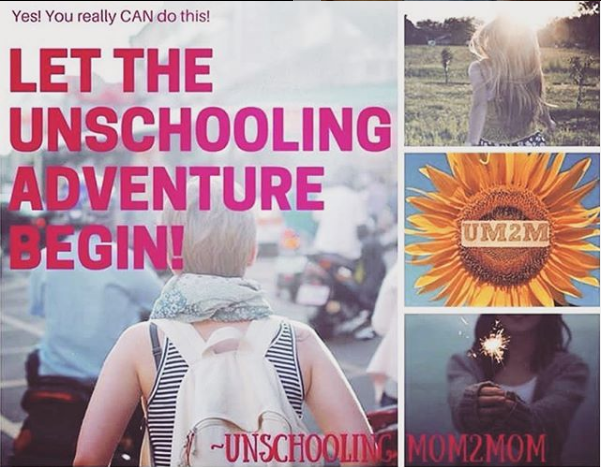
86. Are you holding onto a story of what you envisioned, but it's not going to work with your kids and their personalities?
87. Is it time to let that go, so you can enjoy the kids right there in front of you?
88. Do you need to focus more on their strengths and less on their shortcomings?
89. Deschooling is not the precursor for homeschooling/unschooling - it's an ongoing process as you and your kids both grow.
90. Deschooling is really more for the parents than for the kids
91. Be aware of things going on in your community that your kids might enjoy - dip your toes in all sorts of experiences.
92. Your learning style may not be the same as your child's - they might approach things really differently.
93. Individualizing can be scary - rewarding, but don't be surprised if it makes you nervous!
94. Your creative ideas may get shot down - that's how they learn more about themselves and their own preferences.
95. Unschooling is not "unparenting," but it may be different from the top-down approach you grew up with.
96. Use the word "unschooling" as a compass to help you find other resources/support that don't duplicate school
97. If
you're stressed out, it may not be do to your educational choice - dig deeper to see what's making you angry/frustrated.
98.You are the expert in your child’s life - no one else knows them better than you do.
99. Enjoy the rabbit trails! You’ll all learn so much from these!
100.
Don’t be afraid of the word Unschooling. It just means you’re not doing things the way schools do.
Leave your questions in the comments below and
I can help you figure out what's holding you back from any of these ideas.
Unschooling Guide: New to Unschooling
A $15 PDF full of inspiration and tips to inspire you!
Course: Jumping Into Unschooling
Take a weekend to create a strong unschooling foundation!

